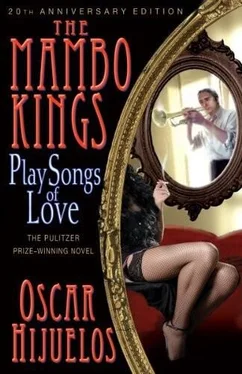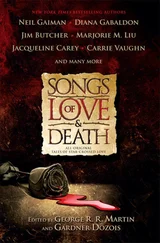That was the way it happened with most Cubans coming to the States then, when every Cuban knew every Cuban. Apartments filled with travelers or cousins or friends from Cuba — just the way it always happened on the I Love Lucy show when Cubans came to visit Ricky in New York, de visita, turning up at the door, hat in hand, heads bowed demurely, with expressions of gratitude and friendliness. Cubans who played the castanets, shook the maracas, danced the flamenco, juggled bones, who trained animals and sang, the men of moderate height with wide-open expressions, the women buxom and small, so quiet, so grateful for the hospitality.
Sleeping on cots in the living room, the brothers were chilled on some nights by the Hudson River wind seeping in through the loose windowpanes, alarmed by the clang, clang of the fire trucks down the street, startled (at first) when the ground shook and the building rattled with the arrivals and departures of the 125th Street El trains. In the winter they shivered, but in the spring they were serenaded by a band of strolling Italian minstrels — mandolin, violin, guitar, and singer. On Sunday afternoons, they searched the radio dials for nice music and listened to Machito’s “Live from the El Flamingo Nightclub” broadcasts on WHN, the brothers happy whenever the percussionist bandleader would say a few words of Spanish between numbers: “And this is a little number for my compadres out there… “Leaning out the window, they watched the scissors man in his heavy black coat, bent back and grizzled face, limping up the street with a grindstone slung over his shoulders and ringing a bell. They bought buckets of ice for their drinks from the ice man, who drove a small black truck. They watched the junk man in his horse-drawn wagon. They were warmed by the coal that came rushing down a chute into the basement, barked at by wild herds of street hounds, and blessed by the priest of the red-doored Catholic church.
When they weren’t out sightseeing or visiting friends, the two brothers wore sleeveless T-shirts and sat in the kitchen studying to improve their English. They read something called A Better English Grammar for Foreign Speakers, Captain Marvel and Tiger Boy comics, the Daily News, the Brooklyn Herald, the racetrack “blue” sheets, and the golden-spined storybooks about enchanted swans and whorl-eyed trees in the Black Forest that Pablo’s kids would bring home from the parochial school. Even though the brothers already knew how to speak a polite if rudimentary English that they’d learned while working as busboys and waiters in the Havana chapter of the Explorers’ Club on old Neptuno Street (“Yes sir, no sir. Please don’t call me Pancho, sir”), the twisted hard consonants and terse vowels of the English language never fell on their ears like music. At dinner, the table piled high with platters of steaks and chops, plátanos and yuca, Cesar would talk about walking on the street and hearing a constant ruido —a noise — the whirling, garbled English language, spoken in Jewish, Irish, German, Polish, Italian, Spanish accents, complicated and unmelodic to his ear. He had a thick accent, rolled his rrrrrrrs, said “jo-jo” instead of “yo-yo” and “tink,” not “think”—just like Ricky Ricardo — but got along well enough to charm the American women he met here and there, and to sit out on the fire escape in the good weather, strumming a guitar, crooning out in English “In the Still of the Night.” And he could walk down the street to the liquor store and say, “One Bacardi’s dark, please…” And then, after a time, with bravado, saying to the proprietor, “How the hell are you, my friend?”
He was proud of himself, as in those days it was a mark of sophistication among the Cubans of New York to speak English. At the parties they attended, given by Cubans all over the city, the better one’s English, the higher his status. Conversing rapidly in Spanish, Cesar would offer proof of his linguistic facility by throwing in a phrase like “hep cats at a jam session.” Now and then he fell in with a Greenwich Village crowd — American girls with bohemian spirits who would turn up at the Palladium or the Palm Nightclub; wild va-va-voom types who did not wear brassieres underneath their zebra-patterned party dresses. Meeting them on the dance floor, the Mambo King impressed them with his moves and Latin-lover mystique, and retired with them to their Village pads (with bathtubs in the kitchen) where they smoked reefers (he would feel a sugarcane field sprouting in his head), listened to bebop, and made out on dog-haired carpets and atop spring-worn couches. He picked up the words “jive” and “crazy!” (as in “Crazy, man, give me some skin!”), and with avuncular sexist tenderness lent them money and took them out to eat. In the period when he briefly went to work at the Tidy Print lithography plant on Chambers Street, to earn some extra money to buy a car, he would spend his lunch hours with this Jewish kid from Brooklyn, Bernardito Mandelbaum, teaching him Spanish. In the course of this he learned a few Yiddishisms. They’d trade words: schlep (dope), schmuck (fool), schnook (ignoramus), schlemiel (wastrel, fool), for bobo (dope), vago (lazy lout), maricón (fairy), and pendejo (ball-busting predatory louse). At some of these parties, where only English was spoken, he was famous for impressing even the driest Cuban professors with the exuberant variety of his speech. And he was a good listener, too, passing entire evenings with his hand on his chin, nodding and repeating, “Ah, yes?” and later, on his way home with Nestor, reciting the new words he had learned like a poem.
In the cane suitcases they’d brought with them from Cuba were bundles of paper on which they’d written down many of their ideas for songs. These mostly had to do with little bits out of their lives. Finding romance and country-bumpkin living funny, Cesar wrote unrestrained lyrics that tended toward obscenities, the change of a word for a laugh (“Bésame Mucho ” to “Bésame Culo"). Hangovers often inspired him: in the days when he and Nestor slept on cots in Pablo’s living room, he would wake up after an epic night out in dance halls and supper clubs, with his skin and hair smelling of tobacco, perfume, and booze, inspiration would strike him, and the Mambo King would drag himself out of bed, take hold of his orangewood Brazilian guitar, strum chords, and with one slippered foot atop the radiator, and head pounding with ironies and pain, write a song.
He wrote the 1950 ballad “Alcohol” on a morning when he woke on the living-room couch with a balled-up pair of nylons in his jacket pocket and a bitten-up lip, feeling as if he had a large heavy-winged blackbird inside his head. Inspired, he strummed his guitar, whistled a melody, made up some lyrics, putting together a rudimentary version of the song that the Mambo Kings would record in 1952, the lyric asking, “ Alcohol, why have you wrested away my soul?”
Other compositions came to him in the same effortless manner, songs written to take the listeners back to the plazas of small towns in Cuba, to Havana, to past moments of courtship and love, passion, and a way of life that was fading from existence.
His (and Nestor’s) songs were more or less typical of the songwriting of that day: ballads, boleros, and an infinite variety of fast dance numbers ( son montunos, guarachas, merengues, guaracha mambos, son pregones). The compositions capturing moments of youthful cockiness (“A thousand women have I continually satisfied, because I am an amorous man!”). Songs about flirtation, magic, blushing brides, cheating husbands, cuckolds and the cuckolded, flirtatious beauties, humiliation. Happy, sad, fast, and slow.
Читать дальше












